A plumbing emergency includes issues like burst pipes, severe leaks, or overflowing toilets that demand immediate action. You need to quickly locate and turn off your main water shut-off valve to prevent extensive damage. Signs of urgency include pooling water, nasty odors, or spikes in your water bill. If you notice any of these, assess whether you can tackle the problem yourself or if professional help is vital. For complex situations, especially with severe clogs or leaks, it's wise to call a plumber to guarantee safe and effective repairs. Uncover more about what constitutes an emergency and how to respond effectively.
Key Takeaways
- Plumbing emergencies include situations like burst pipes, severe leaks, and overflowing toilets that require immediate attention.
- Turn off the main water shut-off valve to minimize damage before assessing the situation.
- Severe water leakage, unpleasant odors, and spikes in water bills indicate urgent plumbing issues.
- DIY fixes may be feasible for minor issues, but consult a professional for complex or persistent problems.
- Regular maintenance and preparedness can help prevent plumbing emergencies and reduce repair costs.
Understanding Plumbing Emergencies
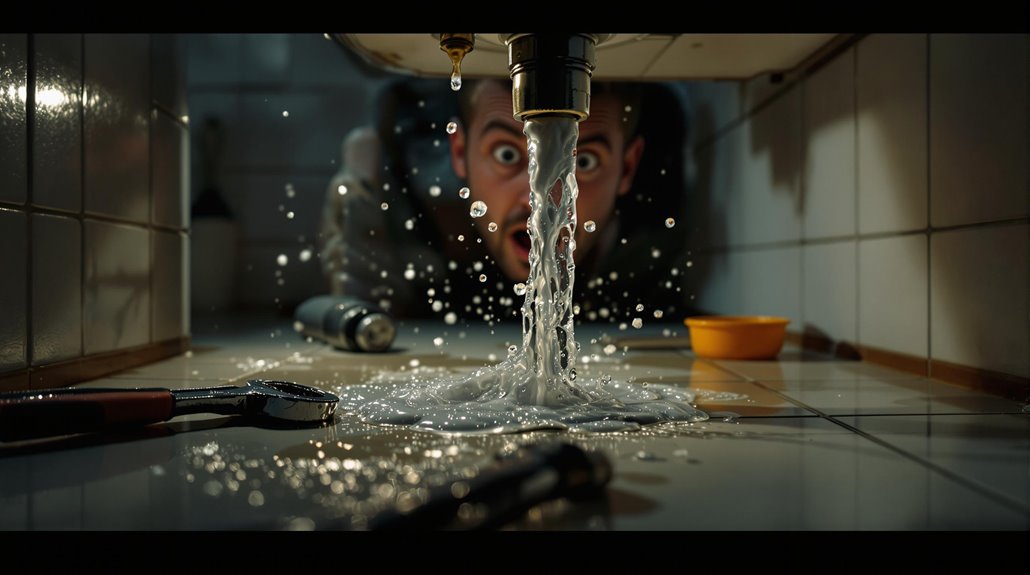
When a plumbing emergency strikes, understanding the situation quickly can save you time, money, and stress. Familiarizing yourself with plumbing basics is critical. Emergencies can include burst pipes, severe leaks, or overflowing toilets. In these instances, immediate action is necessary. You'll want to locate your main water shut-off valve and turn it off to prevent further damage.
Emergency preparation is equally important; having crucial tools like a plunger, wrench, and towels handy can make a significant difference. Knowing how to assess the severity of your issue can guide you in deciding whether to attempt a DIY fix or call a professional. Additionally, recognizing the signs of common emergency plumbing issues can help you act swiftly and prevent further damage. By being proactive and informed, you can navigate plumbing emergencies with confidence and efficiency.
Common Signs of Urgency
When you notice severe water leakage, it's vital to address the situation immediately to prevent further damage. Unpleasant odors can indicate underlying plumbing issues that require urgent attention, while a sudden lack of hot water often signals a malfunctioning heater. Recognizing these signs early can help you avoid more extensive and expensive repairs down the line. Additionally, contacting a professional for emergency plumbing can minimize water damage risks and ensure a swift resolution to the problem.
Severe Water Leakage
Severe water leakage can quickly escalate into a plumbing emergency if not addressed promptly. If you notice water pooling in unexpected areas, such as beneath sinks or around appliances, it's essential to act fast. This pooling can lead to significant water damage, affecting your home's structure and causing mold growth. Look for warped floors, discolored walls, or damp spots, as these are signs of hidden leaks. Implementing effective leak detection methods, like moisture meters or infrared cameras, can help identify the source before the situation worsens. Furthermore, if your water bill spikes unexpectedly, it may indicate a severe leak. Don't hesitate to contact a plumbing professional to assess and resolve the issue before it leads to costly repairs.
Unpleasant Odors Present
Have you noticed any unpleasant odors wafting through your home? These unpleasant smells can indicate serious plumbing issues that require immediate attention. Common odor sources include sewer backups, which emit a foul, rotten egg scent, and stagnant water in drains, which can produce musty odors. Furthermore, a gas leak may present itself as a sulfur-like smell, posing a significant safety risk. Ignoring these signs can lead to worsening conditions or health hazards. If you detect any unusual smells, it's essential to act swiftly. Call a professional plumber to identify the source and address the problem effectively. Don't let unpleasant odors linger; they can signal a plumbing emergency that needs prompt resolution.
No Hot Water
Unpleasant odors aren't the only signs that something's wrong with your plumbing system. A lack of hot water can indicate a serious issue that requires your immediate attention. Consider these signs of urgency:
- No hot water at all
- Fluctuating water temperatures
- Strange noises from your water heater
When you face no hot water, it's essential to address the problem promptly. Start with hot water troubleshooting: check your thermostat settings and verify your heater is powered on. If these no hot water solutions don't resolve the issue, you might have a malfunctioning heating element or a faulty thermostat. Ignoring these signs could lead to more significant problems, so don't hesitate to call a professional when needed.
Burst Pipes and Their Impact
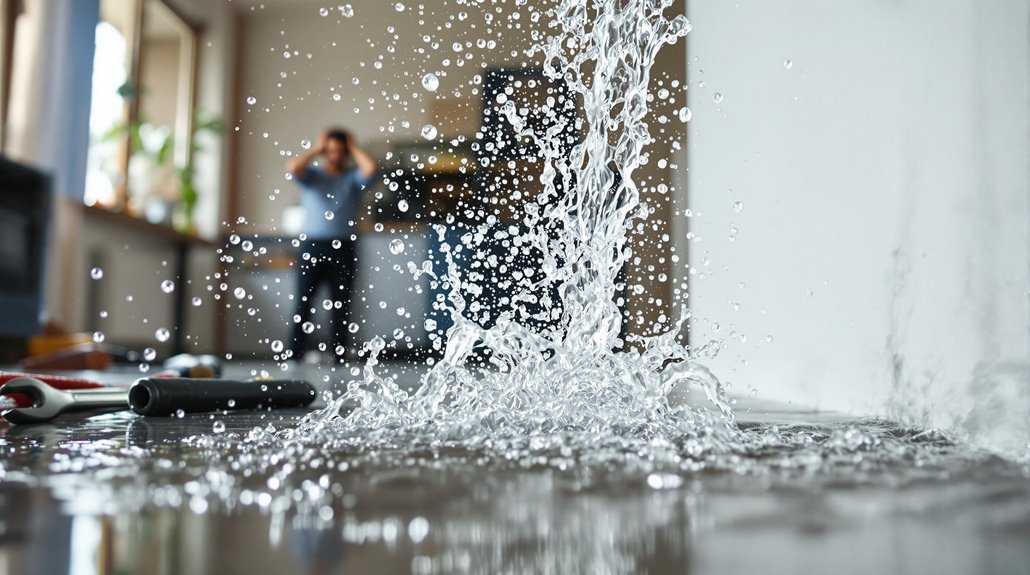
Burst pipes can occur because of a variety of factors, including temperature changes, corrosion, and high water pressure. When a pipe bursts, it's vital to respond immediately to minimize damage and prevent further complications. Understanding the causes and knowing the proper response steps can save you both time and money in a plumbing emergency.
Causes of Burst Pipes
When temperatures drop considerably, the risk of pipes bursting increases dramatically. Understanding the causes can help you prevent significant damage.
- Frozen pipes: Water expands when it freezes, creating excessive pressure within the pipes, ultimately leading to cracks or bursts.
- Excessive pressure: This can occur as a result of clogs or blockages, forcing water to push against the pipe walls beyond their capacity.
- Aging infrastructure: Old pipes made from outdated materials are more susceptible to failure, especially under stress.
Immediate Response Steps
Experiencing a pipe burst can lead to significant water damage and costly repairs. To minimize impact, prioritize emergency preparedness. First, turn off your water supply at the main shut-off valve to halt further leakage. Next, assess the situation to identify the burst pipe and contain any water flow using towels or buckets for quick fixes. If the damage is extensive, consider removing furniture and personal items from the affected area to prevent further loss. After taking these immediate steps, contact a professional plumber for repairs. Remember, acting quickly can save you from costly damage and guarantee your home remains safe. Keep these emergency preparedness tips in mind to handle future plumbing issues effectively.
Severe Leaks: When to Act
How can you tell if a severe leak demands immediate action? Recognizing the signs early can prevent extensive damage and costly repairs. Here are key indicators to watch for:
- Water pooling in unexpected areas
- Significant drops in water pressure
- Sudden increases in your water bill
If you experience any of these, it's time for emergency response. Effective leak detection is vital; don't wait for minor leaks to escalate. Severe leaks can damage your property and lead to mold growth, so swift action is imperative. If you're unsure, consult a professional plumber who can assess the situation accurately and take appropriate measures. Remember, addressing leaks promptly can save you time, money, and stress in the long run.
Clogged Drains and Toilets
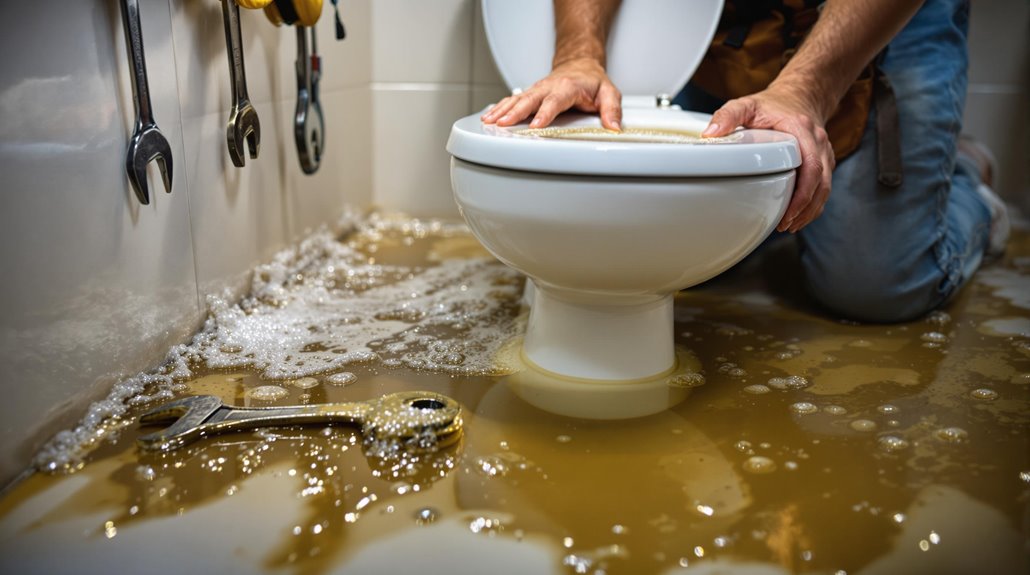
Clogged drains and toilets can disrupt your daily routine, often caused by hair, grease, or foreign objects. Recognizing the signs of severe blockage is essential to prevent further damage. You'll need to weigh the options between tackling the issue yourself or calling a professional for help.
Common Causes of Clogs
While you might not realize it, several common factors can lead to clogged drains and toilets in your home. Understanding these causes can help you prevent kitchen clogs and bathroom blockages.
- Hair and soap scum buildup in showers and sinks
- Food waste and grease accumulating in kitchen pipes
- Foreign objects lodged in toilets
These everyday items can create considerable issues over time. In kitchens, fats and oils often solidify, forming stubborn clogs. In bathrooms, hair and soap residue can combine to form a dense mass, restricting water flow. Regular maintenance, such as using drain screens and being mindful of what goes down the drain, can considerably reduce the risk of experiencing these frustrating blockages. Stay proactive to keep your plumbing system running smoothly.
Signs of Severe Blockage
Recognizing the signs of severe blockage in your drains and toilets is crucial for preventing extensive plumbing issues. If you notice multiple fixtures draining slowly or gurgling sounds from your pipes, these could indicate severe blockage. Water backing up in the sink or tub, even after you've tried clearing it, is another red flag. Foul odors emanating from drains may signal trapped debris, worsening the blockage. Pay attention to frequent clogs, as they often point to underlying severe blockage causes. To avoid these situations, implement regular plumbing maintenance tips, such as avoiding flushing non-biodegradable items and using drain guards. Acting promptly on these signs can save you from costly repairs and guarantee your plumbing system functions efficiently.
DIY vs. Professional Help
When faced with clogged drains and toilets, you might wonder whether to tackle the problem yourself or call in a professional. Here are a few considerations:
- Complexity: Some clogs require specialized tools and techniques.
- Time: DIY repairs can be time-consuming and may not yield results.
- Cost: Mistakes in DIY efforts can lead to higher repair costs down the line.
While DIY repairs can be cost-effective for minor issues, they often lack the professional expertise needed for severe clogs. If you're dealing with persistent blockages or complicated plumbing systems, it's wise to consult a professional. Their experience can save you time and guarantee that the issue is resolved correctly, preventing further damage to your plumbing system.
Water Heater Failures
Water heater failures can occur unexpectedly, leaving you without hot water when you need it most. Common issues include leaks, unusual noises, or inconsistent temperatures. These problems often stem from inadequate water heater maintenance or aging components. Neglecting routine maintenance can lead to sediment buildup, which reduces efficiency and lifespan. If you notice signs of failure, it's vital to act quickly; delaying can result in more extensive damage and costly emergency repairs. Always check the thermostat settings and inspect for leaks first. When DIY fixes don't resolve the issue, don't hesitate to call a professional. They have the expertise to diagnose and fix water heater failures safely and effectively, restoring your hot water supply without further complications.
Overflowing Toilets
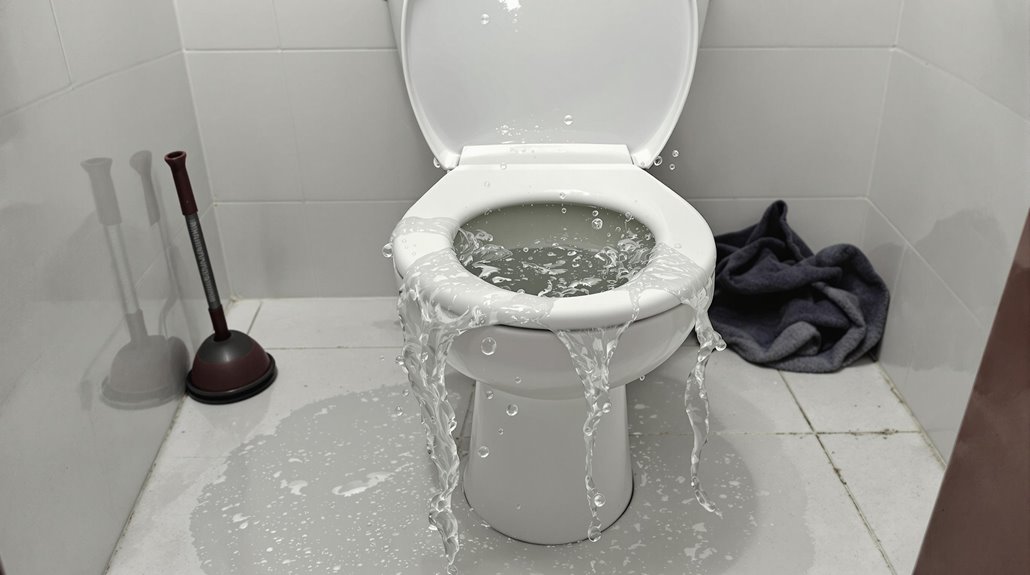
How can you tell if your toilet is about to overflow? Watch for these warning signs:
- Water rising rapidly in the bowl
- Gurgling sounds from the drain
- Unusual odors or slow drainage
If you notice these indicators, act quickly to prevent a plumbing disaster. Regular toilet maintenance is essential; inspect components like the flapper and fill valve to guarantee they function properly. Keep emergency supplies on hand, such as a plunger and towels, to mitigate any overflow situation. If the problem persists or worsens, don't hesitate to call a plumbing professional. Addressing overflowing toilets promptly can save you time, money, and significant water damage in your home. Stay vigilant and proactive in managing your plumbing systems.
Gas Leaks and Safety Risks
An overflowing toilet can lead to significant water damage, but gas leaks pose an even greater threat to safety. Recognizing the signs of a gas leak—like a rotten egg smell or hissing sounds—is essential for your well-being. You should have gas detection systems installed in your home to alert you to any leaks promptly. In case of suspected gas leaks, evacuate immediately and contact a professional. Emergency preparedness is critical; make sure your family knows how to respond. Keep a list of emergency contacts handy, including your gas provider. Regular maintenance of gas appliances can additionally help prevent leaks, guaranteeing a safer living environment. Stay vigilant and prioritize safety to protect yourself and your home.
Sewer Backups
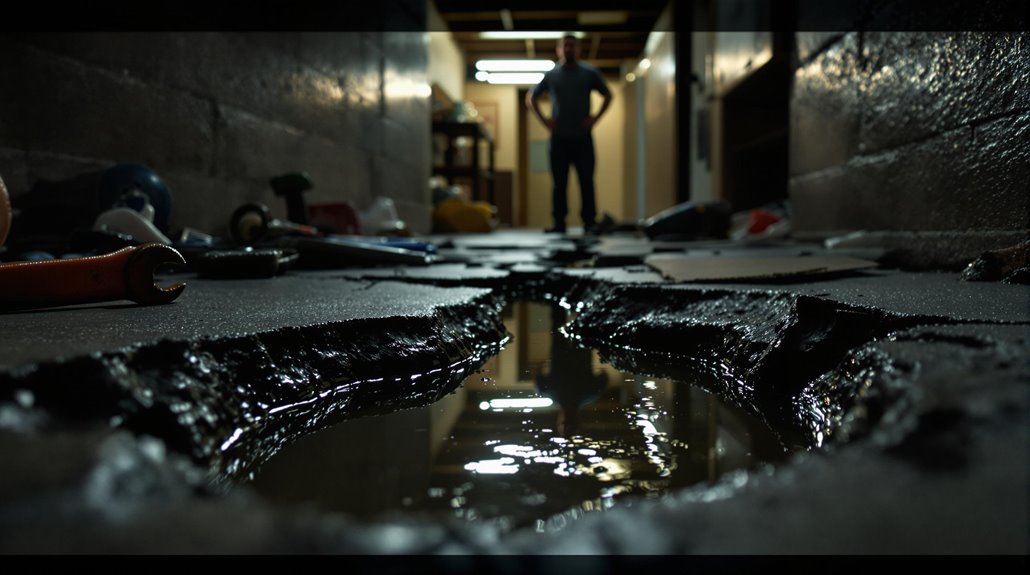
When sewer backups occur, they can create a hazardous situation in your home, leading to potential health risks and extensive property damage. Recognizing when to call for emergency services is vital. Here are some signs you shouldn't ignore:
- Unpleasant odors from drains
- Gurgling sounds in pipes
- Water pooling around floor drains
To minimize risks, regular sewer maintenance is important. Neglecting this can lead to clogs and backups, resulting in costly repairs. If you experience a sewer backup, don't hesitate to contact a professional. They can assess the situation and guarantee safe, efficient resolution. Remember, the sooner you act, the less damage you'll face. Staying informed about sewer issues can save you time, money, and stress in the long run.
Flooding Situations
Sewer backups aren't the sole plumbing emergencies that can wreak havoc in your home; flooding situations can likewise pose serious dangers. When excessive rain or a burst pipe occurs, standing water can damage your property and create a breeding ground for mold and bacteria. It's vital to implement flood prevention measures, such as sealing basement walls and ensuring proper drainage away from your foundation. Equip yourself with emergency kits stocked with necessities like flashlights, batteries, and first aid supplies. If you find yourself facing a flooding situation, don't hesitate to call a professional. They'll assess the damage and implement effective solutions to restore your home while ensuring safety and compliance with local regulations. Quick action can minimize long-term impacts.
Temporary Fixes vs. Professional Help
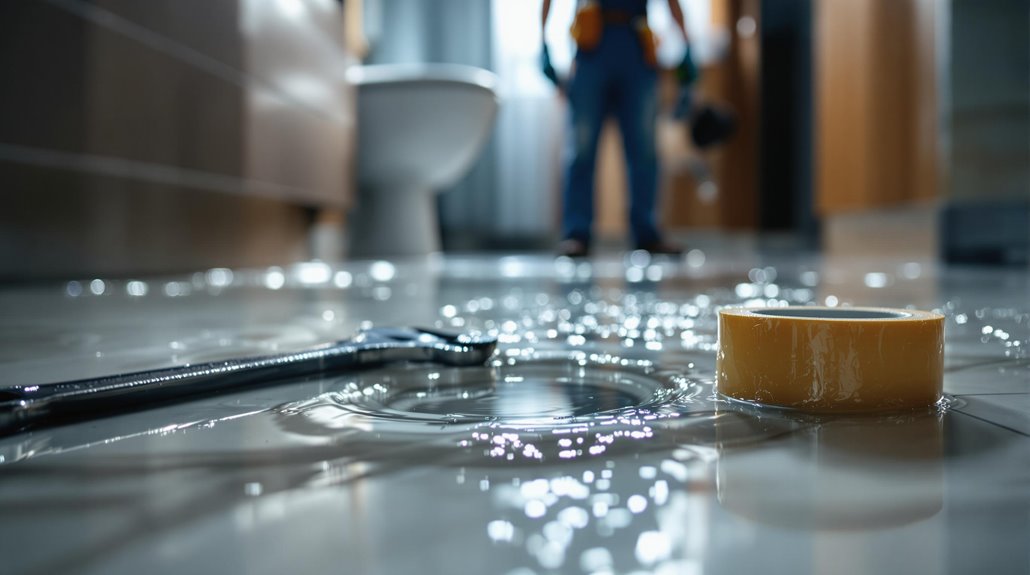
While you might feel tempted to tackle plumbing emergencies with temporary fixes, doing so can often lead to more significant issues down the line.
- Temporary repairs may mask underlying problems.
- Quick fixes often lack durability and can fail unexpectedly.
- Professional help guarantees thorough solutions and peace of mind.
Relying on temporary repairs can provide immediate relief, but they rarely address the root cause of the issue. Without expert assistance, you risk exacerbating the situation, leading to costly damage and repairs later on. When faced with plumbing emergencies, it's essential to evaluate whether a quick fix will suffice or if professional intervention is necessary. In many cases, calling a pro not only resolves the issue but also prevents future complications.
Finding a Reliable Plumber
How can you assure you're hiring a reliable plumber when a plumbing emergency strikes? Start by checking plumber reviews online to gauge the experiences of previous customers. Look for patterns in feedback, focusing on reliability, quality of work, and response times. Ask for recommendations from friends or family; personal experiences can often point you to trustworthy professionals. Moreover, confirm the plumber offers service guarantees, which indicate their confidence in the quality of their work. A reliable plumber should likewise be licensed and insured, protecting you from liability in case of accidents. By conducting your research and verifying credentials, you'll increase your chances of hiring a skilled plumber who can effectively address your emergency.
Conclusion
In plumbing emergencies, acting swiftly can save you from a financial flood. Whether it's a burst pipe or a stubborn clog, recognizing the signs of urgency is vital. Don't let small issues spiral into costly disasters. Trust your instincts and when in doubt, call a professional. They have the expertise to tackle the problem efficiently, ensuring your home stays dry and damage-free. Remember, a stitch in time saves nine—so don't wait until it's too late!
